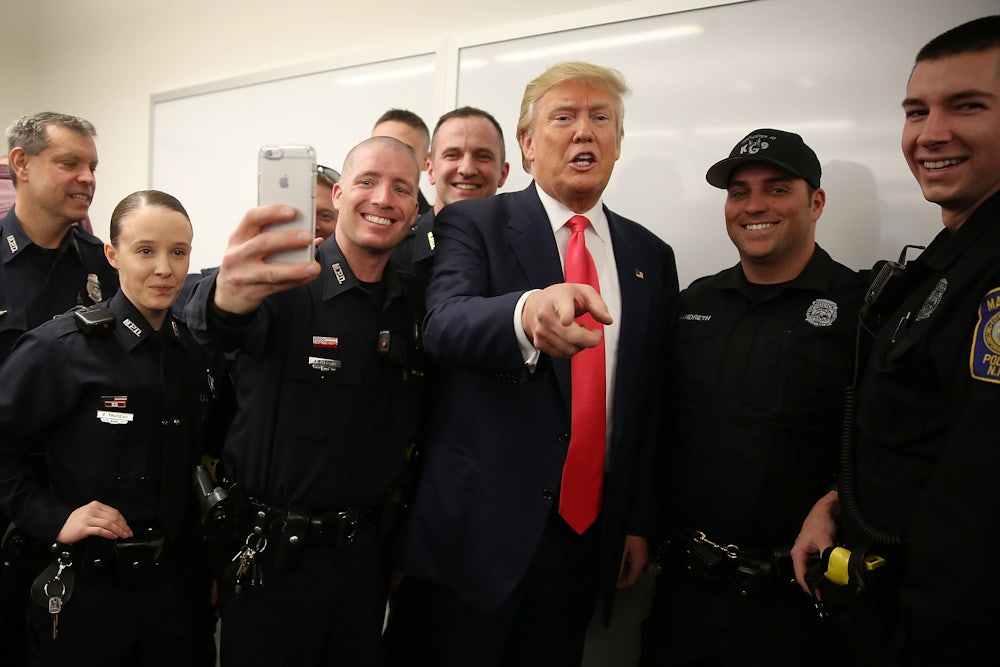Over the past year, more white Americans became convinced that police officers “generally treat blacks and other minorities the same as whites”—and Donald Trump may well be responsible for that trend.
According to new data released Tuesday by the Public Religion Research Institute, 52 percent of Americans—including 64 percent of whites—believe officers mostly treat people equally, regardless of race. That’s up 11 points from this time last year, when just 41 percent of the public thought it was true.
The uptick is driven by a 14-point increase among whites. Latinos saw an 11-point increase, while 62 percent of them still reject the concept of police colorblindness. And black Americans saw a 5-point increase, but 79 percent of them think officers typically don’t treat the races equally.
“The big takeaway is that the distance betweens whites as a whole and African-Americans as a whole has widened over the past year—and it was already a very large gap,” Robert P. Jones, CEO of the Public Religion Research Institute CEO, told The New Republic. The racial divide on the question used to be 36 points. It’s now 45.
Jones believes that Trump, the self-styled “law and order candidate” and stalwart champion of police, has something to do with that widening gap.
“The Republican convention was all about ‘blue lives matter’ and attacks on the police,” Jones said. “The Democratic convention was highlighting the other side.”
Both of the conventions followed July’s targeted killing of five police officers in Dallas, Texas—the deadliest attack on law enforcement since 9/11. That tragedy, part of a broader increase in police deaths this year, may also be driving public opinion, prompting pushback against the Black Lives Matter movement that had been gaining traction.
“You had events on the ground that then got picked up by this powerful communications vehicle,” he said, referring to the conventions and campaigns.
The PRRI results, part of the group’s annual American Values Survey, came a day after new Gallup numbers showing a surge in respect for the police, with 76 percent of Americans professing “a great deal” of respect for cops in their area. That included 67 percent of nonwhites, up 14 points from last year.
The increase was “pretty puzzling” to Nazgol Ghandnoosh, research analyst at the Sentencing Project, a criminal justice reform group. But she stressed that respecting the police—as in, showing respect to officers—is different than approving of their performance.
Ghandnoosh pointed to this Pew Research Center report from just last month: “Only about a third of blacks but roughly three-quarters of whites say police in their communities do an excellent or good job in using the appropriate force on suspects, treating all racial and ethnic minorities equally and holding officers accountable when misconduct occurs.”
Criminal justice reform found bipartisan support on Capitol Hill in recent years, but the legislative push is stalled and may be dead. Holly Harris, executive director of the criminal justice reform group U.S. Justice Action Network, told The New Republic she’s still optimistic about this year’s lame-duck session, even if reform passes in a piecemeal fashion.
Asked about this week’s polls, she acknowledged “the Dallas shootings had a real impact on the public,” but said the push for reform isn’t dependent on a belief that the justice system is racially biased. “We’ve been leading with the public safety impact,” she said. In other words: It will make you safer.
That’s telling—and perhaps a lasting legacy of Trumpism. There’s overwhelming evidence of institutional racism in our justice system and society at large, yet reform advocates are having to work around the fact that white people don’t see the bias—or won’t see it. Instead, they’re appealing to the very fears about public safety that Trump has been all too happy to exploit.
Correction: An earlier version of this article stated that 63 percent of Latinos and 81 percent of blacks don’t believe police treat minorities the same as whites. The correct percentages are 62 and 79, respectively.
